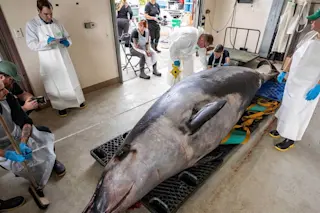In July 2024, scientists in Otago, New Zealand, made a stunning discovery: an elusive spade-toothed beaked whale had washed up on the shore. The whale had never been seen in the wild, and finding a recently deceased adult male meant that, for the first time, scientists could examine the species — an animal around the size of an oversized dolphin that had successfully evaded humans for much of human history.
Alexander Werth, a biologist at Hampden-Sydney College in Virginia, received a call from fellow scientists and later discovered that the team would be dissecting the animal alongside and led by a group of indigenous Māori cultural experts in Aotearoa, New Zealand.
For Werth, it was the opportunity of a lifetime. However, the Māori people were hesitant to allow Western-educated scientists in to study the animal, which they see as their relative. Dissecting it felt suspicious at best. But eventually, Werth ...















